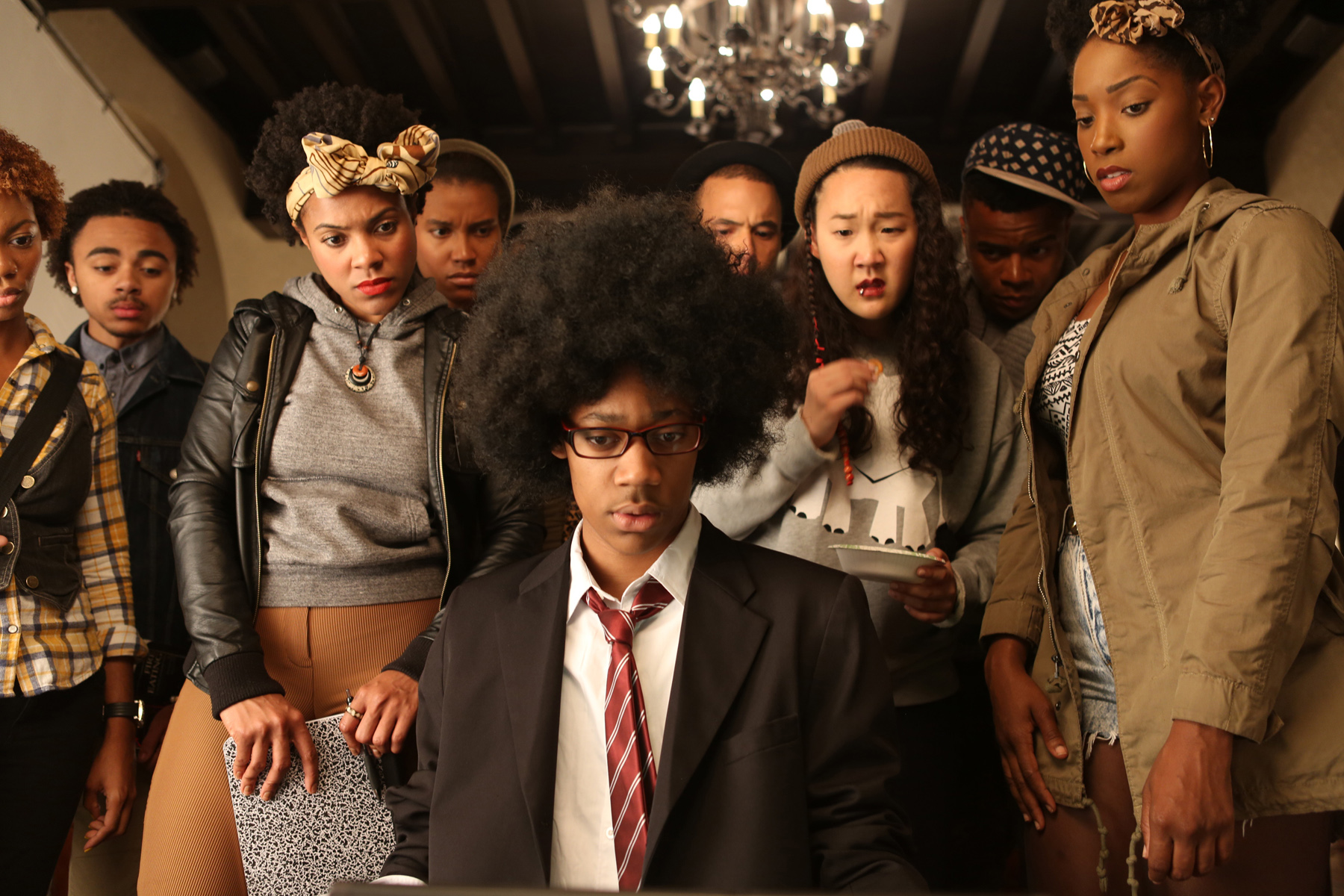Dear White People
Written and directed by Justin Simien
USA, 2014
“Dear white people,” croons Samantha White (Tessa Thompson), a biracial media studies major and controversial radio host at the fictional Ivy League school that serves as the backdrop for writer-director Justin Simien’s debut feature Dear White People, “the amount of black friends required to not seem racist has now been raised to two. Sorry, your weed man Tyrone does not count.”
Mere moments after the lights have dimmed, Simien is already delivering on the film’s tagline: A satire about being a black face in a white place. Drawing from his own college experience in the early 2000s and pushed by a desire to confront issues that weren’t being foregrounded in contemporary popular culture, Dear White People is a passion project that’s been years in the making. Yet despite its title and central conflict (a group of white students throwing a blackface party for Halloween), the film is more the unraveling of an identity crisis than didactic racial allegory. Each character in the multi-protagonist narrative is trying to find his or her niche in the school’s environment, with the unfortunate discovery that sometimes it requires a little acting.
Sam makes a name for herself as a volatile force constantly testing the rules of the establishment, retaliating against a curriculum featuring Birth of a Nation and other derivative characterizations of African Americans by making her own D.W. Griffith-style short for class which, instead of Southern aristocracy freaking out over slave uprisings, features white conservatives freaking out over Obama’s reelection. Ex-boyfriend Troy (Brandon P. Bell) maintains an active role in the black student union and house while trying to curry favor with Pastiche, the popular humor magazine staffed by white students under the leadership of the university president’s son. Meanwhile, Coco (Teyonah Parris), a fellow student, tries to leave her lower-class roots behind only to realize that if she wants her video blogs to go viral, she needs to embrace the “ghetto” persona that the Internet loves.
Through the black-and-white filter placed over the prestigious Winchester University (the lone Asian student with a speaking role confesses she joined the black student union because their snacks are better than the Asian equivalent), Dear White People demonstrates why the concept of a post-racial, colorblind society is completely self-delusional. All it takes is a microaggression, like a black girl being asked if her hair is “weaved” or a white girl begging her boyfriend to screw her with his “big black cock.” Simien’s script is full of sharp one-liners that are sure to make viewers cringe while they laugh because, let’s face it, many of us have heard, said, or thought about saying such comments. He isn’t the first writer to throw it back in viewers’ faces, but while others merely toe the line between political correctness and incorrectness for broad comedic purpose, Simien tries to dig deeper.
During the post-screening Q&A, Simien confessed that he originally thought about cutting the blackface party from the story because he thought audiences might find it too outlandish. But then he did his research and, to his horror, found that such events on college campuses are all too common. From UCSD and the University of Arizona to Dartmouth, white students across the nation have been exercising their right to free speech in questionable, racially motivated ways.
“Which came first, the chicken or the blackface party?” joked the director, noting that these themed parties have probably been going on for years, but have only recently gained attention thanks to the rise of social media. (Revenge is exacted by strategically placing photos from real parties in the ending credits.)
The paradox of higher learning institutions, in the film as in real life, is that despite being widely held as erudite bastions of the liberal arts, they seem to be failing our generation in critical ways if their students believe objectifying and stereotyping ethnic groups is acceptable. Did it make the cast uncomfortable?
“Those poor, poor white extras,” lamented Simien in reference to shooting the big party scene in Minnesota, where the actors were asked to do things they’d been taught were wrong.
Despite getting picked up after a well-received debut at Sundance, so far, all that can be seen online of Dear White People is the original concept trailer which, although it bears a strong resemblance to the final cut, is nowhere near as polished. Regardless, the clip has attracted a bevy of comments.
“The point of art is to hold up a mirror,” said Simien, “Some people aren’t ready to look at the reflection, and that’s okay.” If the white supremacist-heavy backlash against the infamous Coca-Cola ad celebrating our nation’s diversity that aired during the Super Bowl earlier this year is anything to gauge against, then, yes, many people aren’t ready for such self-scrutiny.
The film has an episodic, sometimes frenetic feel to it, but multi-protagonist stories are difficult to execute, let alone pull off. Here, it works because Simien wants to provide a full-spectrum perspective. Dear White People strives to be everywhere and do everything at once, and for those who can keep up, it’s a brilliant commentary on the problems with how we define our peers and ourselves.
— Misa Shikuma


